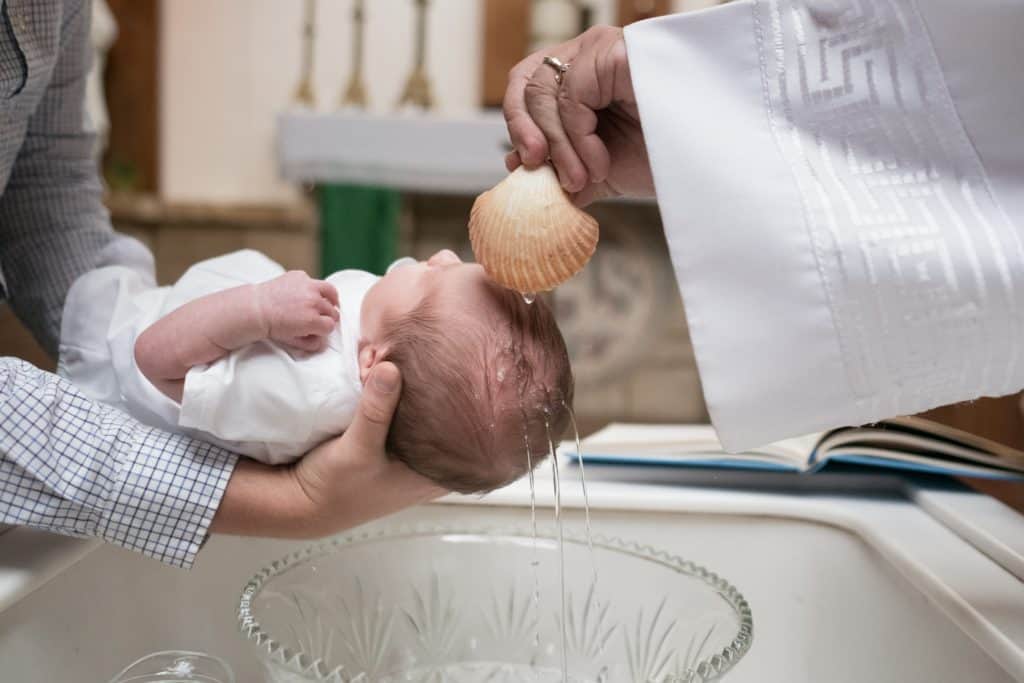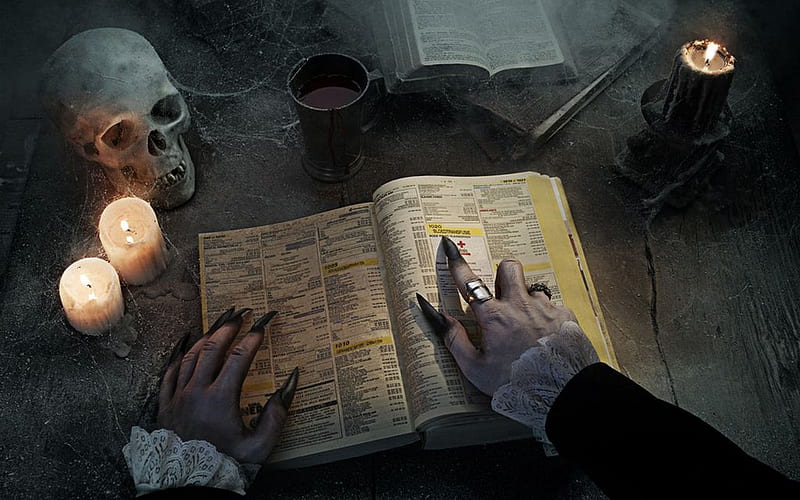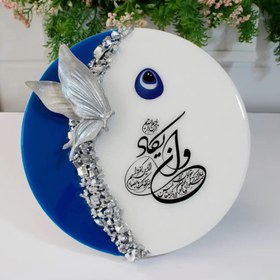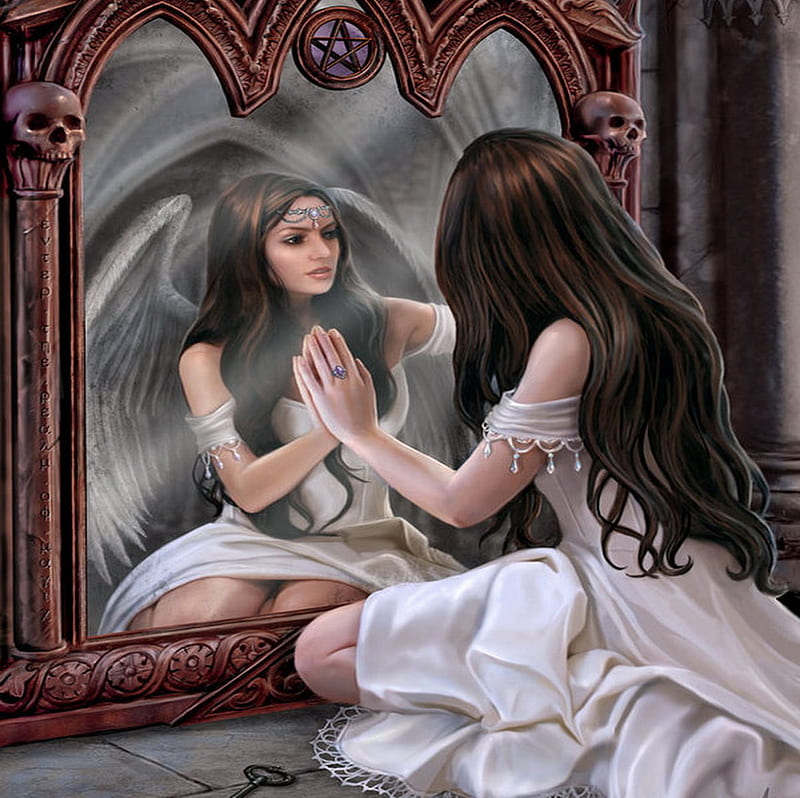In normal observers, gazing at one's own face in the mirror for a few minutes, at a low illumination level, produces the apparition of strange faces. Observers see distortions of their own faces, but they often see hallucinations like monsters, archetypical faces, faces of relatives and deceased, and animals. Individuals with body dysmorphic disorder are compulsively drawn to the mirror, checking the mirror to ease their fears about how they think they look or continuously checking to see if their perceived deformity is still there or has become worse.
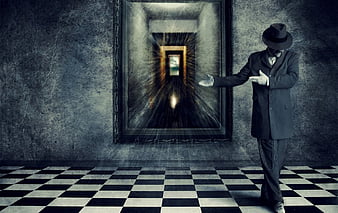
The consequences of obsessive mirror checking
When you become stuck or fixated on your perceived physical flaw for too long, your body's stress level increases which can impact your brain's functioning, impairing your ability to function rationally and therefore your emotional and mental health.
به عقیده برخی اگر انسان در شب در آینه نگاه کند، روح از نشاط او تغذیه می شود! به خصوص زمان بین 12 صبح تا 3 بامداد (Midnight to 3am) خطرناک است. در این هنگام خود شیطان در آینه دیده می شود. به همین دلیل است که این بازه زمانی را «ساعت شیطان» می نامند! در میان بسیاری از ملل مختلف قوانین برای کار با آینه وجود دارد، یکی از مهمترین آنها این است که بعد از تاریک شدن هوا در آینه نگاه نکنید. یکی از توضیحات این است که پس از تاریک شدن هوا، نوعی درگاه در آینه باز می شود،نوعی ارتباط با جهان دیگر.
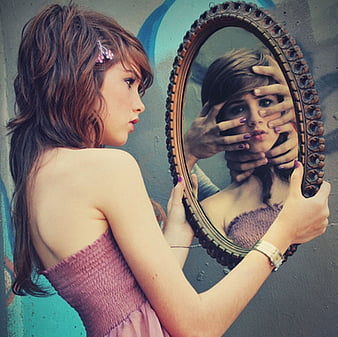
Why do we look bad in some mirrors?
Thickness Different mirrors have different glass thicknesses, which can easily make you look different. If your proportions look out of whack in one mirror but not another, it's likely that the glass is just too thin. Glass is heavy, so a thin mirror will often buckle under its own weight and warp.
If you are struggling with low self-esteem, it may be difficult to look at yourself in the mirror. Mirrors reflect an image of ourselves back to us. When we don't like ourselves, it can be hard to look at ourselves. Overcoming low self-esteem is achievable with some adjustments to your thought process and behavior.
Why looking in the mirror is a bad idea. If you're not happy with your body, looking in the mirror may be a bad Idea. Every time you look in the mirror with a critical eye, you may be reinforcing a negative self-image. Unless otherwise directed, most of us tend to focus on what we don't like about our body.
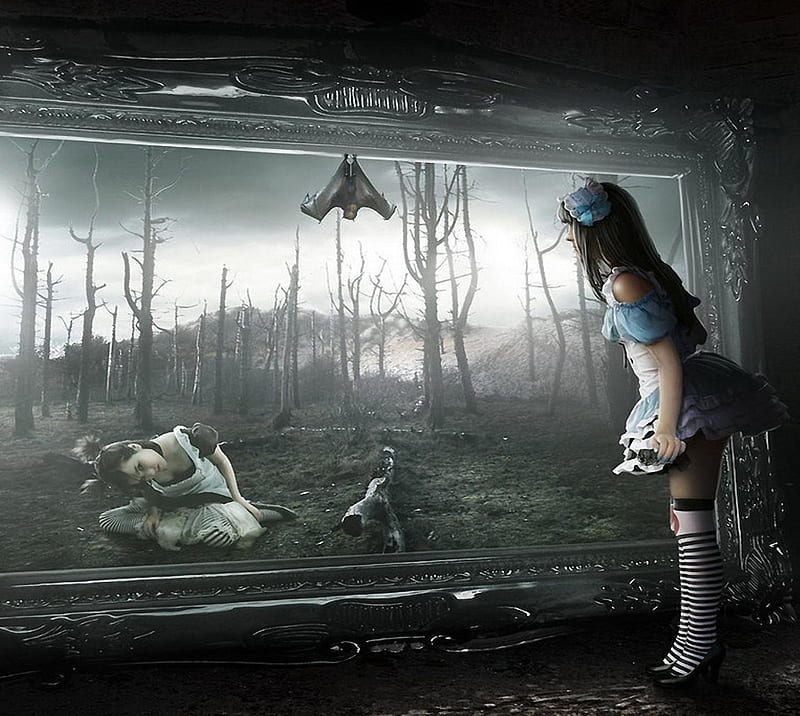
The word mirror derives from the French “mirour,” from the Latin “mirari”—to admire. (The Romans themselves, however, used the word “speculum,” from “specere”—to look, or behold.) METAL MIRRORS — Mirrors were used by the ancient Egyptians as early as c. 2900BC.
چرا نگاه کردن به آینه در شب بد می باشد ؟
اگر در اتاق خوابتان آینه دارید بطوریکه ھنگامیکه روی تخت ھستید میتوانید خودتان را ببینید بھتر است که جای آن را عوض کرده و یا ھنگام خواب روی آن را با پارچه ایی بپوشانید . در غیر اینصورت ممکن است دچار بی خوابی ، کابوس و یا کاھش انرژی گردید . به طور معمول ، شما بارھا خود را در آینه میبینید ، بدون شک ھمه میخواھند بی نقص بنظر برسند . اما خیره شدن بیش از حد به خود علی الخصوص در شب ممکن است منجر به تجربیات ناخواسته ایی گردد .وقتی شب ھا با مغزی خواب آلود از خواب بیدار میشوید و انعکاس خود را در آینه میبینید ، ممکن است از چھره خود بترسید ، ممکن است خود را یک روح و یا ھیولا در نظر بگیرید . در نتیجه ممکن است دچار مشکل خواب زدگی شوید .
دو دیدگاه در مورد قرار دادن آینه وجود دارد :
اولینش اینه که وقتی شب میخوابید ، روح شما از بدنتان خارج میشود و اولین چیزی که میبیند، بازتاب خودتان است . و اینگونه روح دچار تشویش خواھد شد .برای درک بھتر دیدگاه دوم میباید تا حدودی با فلسفه فنگ شویی آشنا باشید .فنگ شویی معتقد است زمانیکه میخوابید ، بدن شما با انرژی چی یا انرژی حیات پر میشود . که تاثیر مثبتی بر روی بدن شما گذاشته ، انرژی روز بعد را به شما میدھد و باعث آرامش و سلامتی شما خواھد شد . اما اگر آینه ایی روبرو تخت خود دارید ، انرژی منفی نمیتواند شما را ترک کند . طبق دیدگاه فنگ شویی ، ھر چیز بازتابنده ای مانند صفحه تلویزیون ، قاب شیشه ایی نقاشی باید قبل از خواب پوشانده شود . دلیل ترسناک بودن آینه ھا در شب فقط درک شما و پردازش مغز شما میباشد .علاوه بر این برای جلوگیری از محدودیت انرژی منفی در اتاق ، نباید روی سقف نیز آینه ایی قرارداد .در کل نگاه به آینه برای اصلاح ھرگونه نقص صورت مانند آرایش ، مدل مو و غیره چیز بدی نیست ھمینطور قرار دادن آینه دستی کوچک در اتاق مشکلی ندارد ، اما اگر برای مدت طولانی در نور کم به آینه خیره شوید ، مغز شما شروع به واکنش ھای مختلف میکند و ویژگیھای کمتر تمرکز را با محرک ھای اطراف ترکیب میکند . در نتیجه ممکن است از چھره تغییر شکل یافته و ناموزون خود بترسید .

بیایید در مورد دلایل آن بحث کنیم :
چشم انسان دارای قدرت و حساسیت به حرکت است . کره چشم ما به طور طبیعی در جھت حرکت جذب میشود . اگر آینه ایی رو به تخت دارید و انعکاس ھر جسمی را در آن میبینید ، چشمان شما فورا در جھت حرکت متمرکز میشوند و خواب شما را پرت میکند .
برخی از افراد وضعیتی را تجربه میکنند که به عنوان مستی در خواب شناخته میشود . در این شرایط ، حواس بینایی آنھا بلافاصله پس از بیدار شدن ، کاملا بیدار نیستند. آنھا میتوانند با نگاه تصادفی در آینه درست پس از بیدار شدن خود را بترسانند. معمولا آینه ھای خانگی ، آینه ھای کامل نیستند . این آینه ھا انعکاس سبز رنگی را نشان میدھند که به دلیل جذب نور قابل توجھی است که روی آنھا میافتد ، آینه ھا نه تنھا نور را منعکس میکنند ، بلکه صدا را نیز منعکس میکنند . اکثر آپارتمان ھا دارای آینه بزرگی در روی کمد در اتاق خواب میباشند ، اگر نزدیک آینه کمد بخوابید ، ممکن است متوجه صداھای بلندتر از قسمت ھای دیگر خانه شوید و یا اگر شریک شما خر و پف میکند ، صدای خروپف منعکس شده بیشتری را خواھید شنید که میتواند بر کیفیت خواب شما تاثیر بگذارد .
What does Islam say about sleeping in front of a mirror?
Look at the mirror any time of the day or night if you so choose to. There's nothing in Islam, Quran or Ahadeeths that forbids it.
Is it bad to have mirrors facing your bed in Islam?
The belief is that the mirror can reflect energy, causing restlessness and disrupting sleep. Additionally, the mirror can create a sense of being watched and can amplify any negative energy in the room.
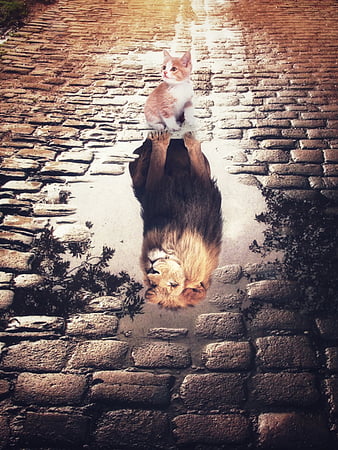
Why not sleep in front of mirror?
It Can Disturb SleepHaving a mirror facing the bed can disturb your sleep, especially if you're sensitive to light. Even if the room is dark, any light reflected off the mirror can cause discomfort and prevent you from falling asleep or staying asleep. It could also give you the impression that you are being watched.
What are the negative effects of mirrors?
Mirror Vastu: Negative effects of wrong mirror placement
Placing a mirror in this direction increases the chances of quarrels and tiffs. Placing mirrors opposite to each other encourages restlessness. Mirrors should not face north or east, as this reflects away the positive energy entering from these areas.
What is fear of mirrors called?
Eisoptrophobia is a rare phobia, that causes sufferers to be irrationally fearful of mirrors or seeing themselves in a mirror. Those with this phobia present some of the following symptoms or reactions: Anxiety. Panic.
Eisoptrophobia is an unhealthy fear of mirrors. Some people fear mirrors due to self-image issues. People may also avoid mirrors because they distort the way an object looks. This phobia leads to lifestyle changes that enable people to avoid mirrors.
Do mirrors help dark rooms?
Making a dark room lighter is all about controlling the way light interacts with space. The key is to increase the amount of light reflecting through a room. For example, lighter paint colours reflect more light, which is why they help a space to feel brighter. The ultimate way to increase light is through mirrors.

Which wall should not have mirrors?
Mirrors should always be placed on the eastern and northern walls of the house and never on southern or western walls
A mirror facing the bedroom door, or any door, risks deflecting the positive flow of chi right back out of the room. The only remedy for this situation is to relocate the mirror so that it's no longer directly across from the door.
Feng shui meaning encompasses the idea that human life is connected to the environment. It comes from the Taoist belief in chi, which is the life force present in everything. In feng shui arranging objects and choosing decor has the aim of balancing opposing but complementary yin and yang elements to improve the flow of positive chi, and ward off negative chi.
Consider Feng shui mirror rules – for wealth, prosperity and well-being
for the bedroom, the living room, for the kitchen, for the home office , for the bathroom, for the entryway, for the dining room and ...
پژوهشگران آمریکایی به این نتیجه رسیده اند که نگاه کردن بیش از سه دقیقه به آینه به از دست رفتن انرژی و در نتیجه خستگی و در برخی موارد نیز به از دست دادن حافظه و پیری زودرس منجر میشود.
دانشمندان معتقدند با خیره شدن زیاد به آینه میدان انرژی پیرامون انسان شروع به ضعیف شدن می کند به گونه ای که بدن مقاومت خود را در برابر تاثیرات محطیی پیرامون خود از دست می دهد و آینه به جذب کننده انرژی تبدیل می شود.این پژوهشگران بر این باورند که شعور باطنی، آینه را مانند لوح های فشرده ای می داند که اطلاعاتی که فرد در برابر آینه بازگو می کند را حفظ و بیان کرده و بدین ترتیب مزاج افراد را نیز حفظ می کند و همین نکته آن را به منبع انرژی فراوانی تبدیل کرده است. آنان در عین حال خاطرنشان می کنند که آینه ممکن است دارای تاثیرات مثبتی نیز برانسان باشد زیرا زمانی که انسان با لبخند در آینه به خود نگاه می کند به انرژی مثبتی دست می یابد و این انرژی از آینه به صاحب تصویر انعکاس می یابد و ذهن وی برای موفقیت و خوش شانسی برنامه ریزی می کند.
در حديثى معتبر آمده كه امام صادق عليه السلام از رسول خدا صلی الله عليه و آله نقل كرده است : «خداوند عالميان بهشت را واجب مىكند بر جوانى كه بسى در آيينه نگاه كند و حمد (و شكر) خدا بسيار گويد در برخى روايات آمده است كه حضرت رسول صلی الله عليه و آله خود را در آيينه نگاه مىكرد و بر موى سر وصورتش شانه مىزد. و خويش را براى هنگام روبهرو شدن با اصحاب يا همسرانش مىآراست و مىفرمود: «خداوند دوست مىدارد بندهاش هنگام ملاقات با برادران مؤمن، خود را بيارايد».
در كتاب فقه الرّضا آمده است كه: «هرگاه بخواهى در آيينه نگاه كنى، آيينه را به دست چپ بگير و بسم الله بگو و هنگامى كه در آن نگاه كردى دست راست را بر پيش سر بگذار و بر صورت بكش و محاسن خود را به دست راست بگير و در آيينه نگاه كن
See also:
- Mirror Myths & Superstitions
- Why are mirrors used in horror?
- Where shouldn't you place mirrors?
- Which direction is wrong for mirrors?
- Feng Shui Mirror Placement Tips for the Home
- Why You Should not Stand Naked in front of The Mirror

